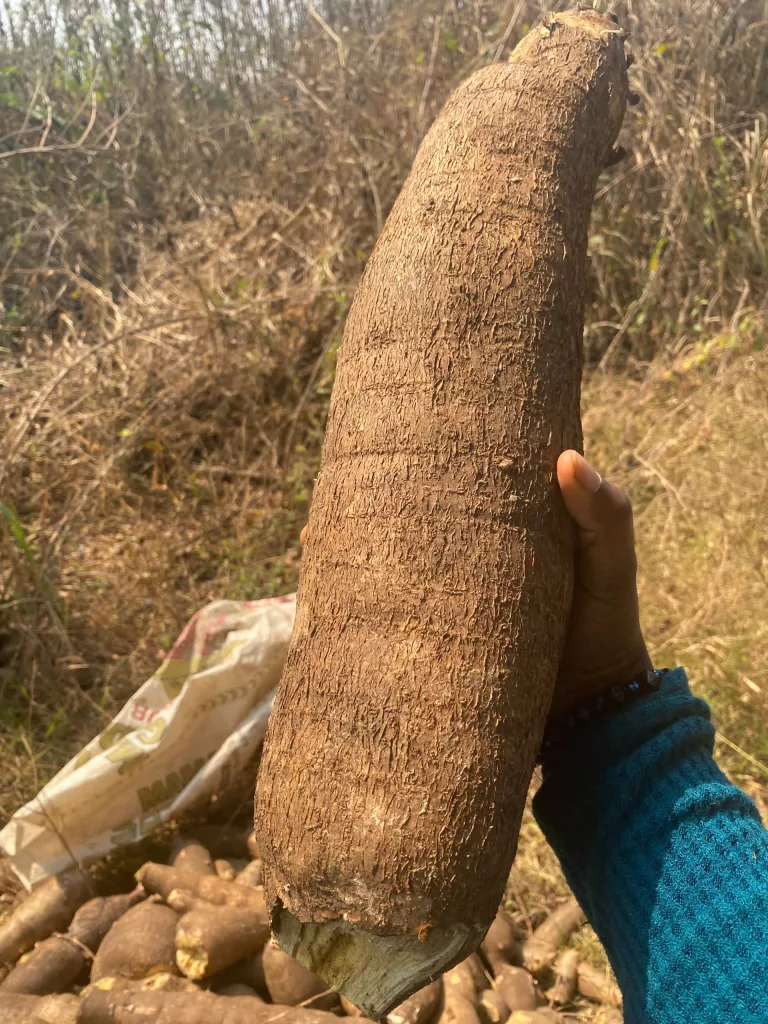Farmer Albert Ukaeke on his vitamin A cassava farm
Albert Ukaeke (73), is a small holder crop farmer, who hails from Delta State in Nigeria and farms in the remote Abegede village in Ido Local Government, Ibadan, Oyo State. Albert, and his family started off with growing their family’s primary source of food – yam, cassava and vegetables. Despite having a regular source of food, Albert soon realised that he could start making income from farming after seeking endlessly for jobs with his Diploma in Forestry from the College of Forestry, Ibadan; first degree in Geology (1981) and a Master’s degree in exploration Geophysics (1984) from the premier University of Ibadan. “I was working with a borehole drilling company, and had a family to cater for. I lost my job after going for a training in America. Despite that, the company I worked with then, promised to keep a position for me, I couldn’t secure any position for almost a year after I came back. That was how I was lured into farming. It was not a line I was fully into, but I just knew how to plant cassava and yams because my father was a farmer too”, Ukaeke explained.

The typical size of a tuber of vitamin A cassava harvested on the farm
“I specialise in crops such as cassava, yam and maize and do vegetables seasonally. I just started piggery last year with five females and two males. I have an oil plantation at Araro off Bakatari, still in Ido here. I am just getting serious with it now, to get a mill and start processing on my farmland”, he added. A proud member of the Agbesumibare Farmers Group in Agbofieti in Ido, he said his turnaround from subsistence farming came when he encountered the Sustainable Farmers Association of Nigeria (SUFAN) training, through the Justice Development and Peace Commission (JDPC), Ibadan; on agribusiness, good agricultural practices, and more. He said, with the marketing hub of the group as well as the cooperative society; Ukaeke, like many more farmers in rural areas, is experiencing a decline in produce yield due to the incessant Fulani herdsmen encroachment on their farmlands besides bad road network.
The 73 year old farmer explains how Fulani herdsmen recently destroyed some crops on his farm.
“They are constituting a lot of havoc for us. It worsened from late 2023 and we have complained and reported. Things have improved still. They uproot our cassava and give their herd to eat when you are already having expectations of yield. By the time you get to your farm, you are heart broken at the sight of cow poo on the ground and damaged cassava stems. They usually do that when we have retired to our homes, especially weekends, and when we reported, they told us to try and catch one of them, but how can I catch a cow and keep it? It is not easy to do that!”, he lamented. Speaking of the advantages of planting vitamin A cassava, he said, “it does not rotten easily and rodents don’t eat it. And they can produce very big tubers”. Narrating some of his challenges, “During the raining season, the road here is so bad. To sell and take produce to market is not always easy on this road.”, he continued.
“Now that garri price has spiked up, I now sell for N1,000 per congo. When the white garri was N500, I was selling the vitamin A garri for N600 here, but now, everything has been inflated due to cost of production. The only problem I have now, is that I can’t meet the demands like before. For instance, some people from Lagos requested 50 bags of 50kg, but the last harvested ones from last year planting, which I have for frying now, cannot suffice for that”, he said. Ukaeke also plants other common variants of cassava, white and red maize alongside yam and vegetables, organically. “I do not add any chemicals or even insecticides. We produce dongoyaro for instance, to scare away insects so as not to poison our produce. When you have fertile lands like we have here, it’s a waste of resources to even use fertilizers. There is no risk of food poisoning from what I grow on my farm”, he said.
A granddaughter of Farmer Albert peeling some cassava with other farm workers
“That is why the shelf-life of my produce is long. When you use fertilizers on yams for instance, the shelf-time is always cut short on time; they rotten easily. For piggery, he reflected on his partnership with another farmer, who built the pen and how they have an agreement of him supplying the feeding materials for the pigs from his farms. We are piling up the waste from the piggery to use later for planting. Even though he enjoys planting most of the times”, as he recognised the significance of farm helps, who help him maintain his farm lands in Abegede and even sometimes secure them from encroachments. “I have three boys presently working with me, which is what I can afford in my capacity and they are really helping me a lot. Some of the things I do on the farm, planting, riding bike and all, are all that I use to exercise my body while I also enjoy proceeds and returns from my hard labour on the farm”, he concluded.
Reflecting on his successes so far, he said, “I have achieved a lot through farming; I have built my house, sent my children to school; higher institutions. Here, we do not necessarily wait for government to help us; we create groups and inspire ourselves. Farming never expires and even when one gets very old, you can get people to do it for you while you oversee. I would like to encourage people to develop a liking for farming to ensure food sufficiency in our nation”.


